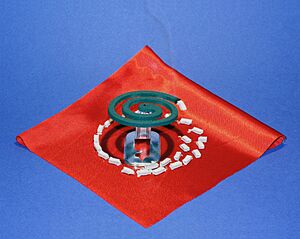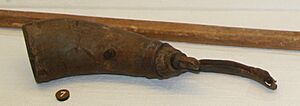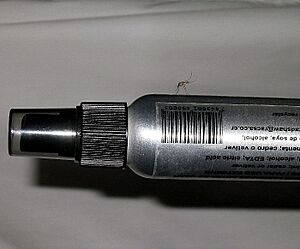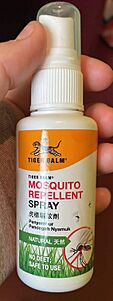Insect repellent facts for kids
An insect repellent is a special substance that you put on your skin, clothes, or other surfaces. It helps to stop insects and other small creatures, like ticks, from landing or crawling on you. People often call it "bug spray."
Using insect repellents can help protect you from diseases carried by bugs. These include illnesses like malaria, Lyme disease, and dengue fever. Bugs like mosquitoes, fleas, and flys can spread these diseases.
Some insect repellents are also insecticides, which means they can kill bugs. But most repellents just make bugs want to stay away without harming them.
Contents
Types of Insect Repellents
Insect repellents can be made from chemicals (synthetic) or from natural sources like plants.
Common Chemical Repellents
These are some of the most common man-made ingredients found in bug sprays:
- DEET (N,N-diethyl-m-toluamide) is one of the most widely used and effective insect repellents.
- Icaridin, also known as picaridin, is another popular choice. It works just as well as DEET.
- Ethyl butylacetylaminopropionate (IR3535) is often used in repellents, especially for children.
- Metofluthrin is a chemical used in some plug-in devices to repel mosquitoes.
- Permethrin is a chemical that kills insects rather than just repelling them. It's often used on clothing or gear, not directly on skin.
Common Natural Repellents
Many plants and natural oils have properties that can keep bugs away. Here are a few examples:
- Citronella oil is well-known for repelling mosquitoes. You might see it in candles, but candles are not very effective.
- Essential oil from the lemon eucalyptus tree contains a compound called p-menthane-3,8-diol (PMD), which is a good repellent.
- Catnip oil contains a substance called Nepetalactone that can repel mosquitoes.
- Neem oil comes from the neem tree and can repel or even kill many insects.
- Tea tree oil from the leaves of the Melaleuca alternifolia plant also has repellent qualities.
- Birch tree bark can be made into a tar that, when mixed with other oils, can repel mosquitoes.
Natural Repellents from Plants
Many plants have natural compounds that act as insect repellents. Some of these are even approved by organizations like the United States Environmental Protection Agency.
Here are more natural products that can help keep bugs away:
- Basil (especially sweet basil)
- Breadfruit can repel insects, including mosquitoes.
- Camphor is known to repel mosquitoes.
- Castor oil can help keep mosquitoes away.
- Cinnamon leaf oil can kill mosquito larvae.
- Clove oil is effective against mosquitoes.
- Eucalyptus oil (with over 70% eucalyptol) can repel mosquitoes and flies.
- Garlic can repel mosquitoes and other insects.
- Lavender can have some repellent effect when mixed with other ingredients.
- Lemongrass oil is often used to repel mosquitoes.
- Mint (containing menthol) can also help.
- Rosemary is known to repel mosquitoes.
- Thyme can be used to repel mosquitoes.
Methods That Are Not Very Effective
Some ideas about repelling insects are not supported by science. For example:
- Taking large doses of thiamine (vitamin B1) does not work to repel mosquitoes.
- Eating garlic does not effectively repel mosquitoes.
- Ultrasonic devices that claim to repel mosquitoes have been proven to be useless.
- While some plants like lemon balm or lemon grass have repellent properties, they usually only work for a short time if their leaves are crushed and rubbed directly on the skin.
Other Ways to Avoid Bug Bites
Besides using repellents, there are other things you can do to protect yourself from bug bites:
- Use a mosquito net: These nets can be placed over beds or tents to create a bug-free sleeping area.
- Wear protective clothing: Long sleeves and pants can cover your skin, making it harder for bugs to bite. Tuck your clothes in to seal up any gaps.
- Avoid peak bug times: Mosquitoes are often most active during dawn and dusk. Try to stay indoors during these times if possible.
- Use a fan: Moving air makes it difficult for mosquitoes to fly and land on you.
- Choose light-colored clothing: Light colors are harder for mosquitoes to see.
- Limit strenuous exercise: When you exercise, you produce more carbon dioxide, which attracts mosquitoes.
See also
- Mosquito control
- Mosquito net
- Pest control





